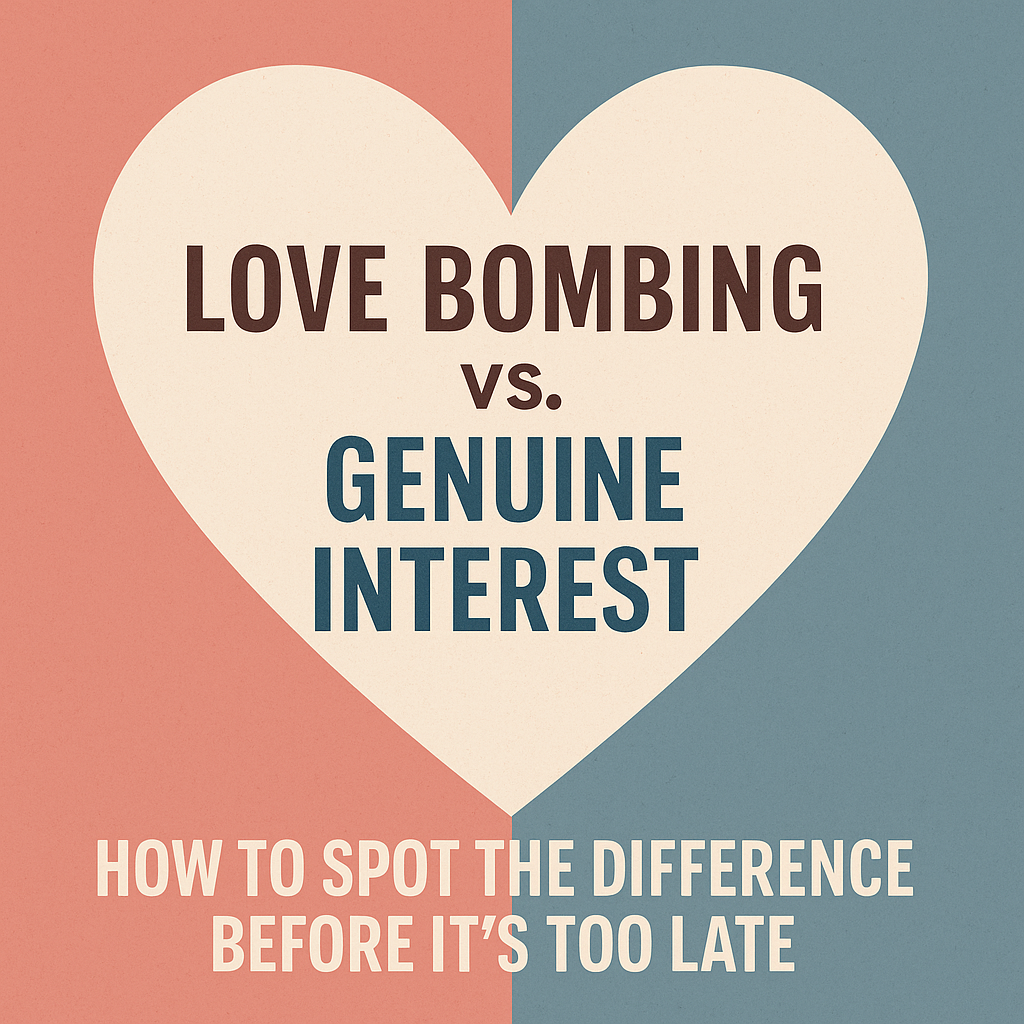
When someone floods you with attention, flattery, and affection right from the start, it can feel intoxicating. You might think, Finally, someone who really gets me. But sometimes, what seems like intense romantic interest is actually something more manipulative: love bombing.
In this article, we’ll break down the key differences between love bombing and genuine interest. You’ll learn the signs of both, the psychological motivations behind love bombing, and how to protect yourself without shutting out authentic connection.
What Is Love Bombing?
Love bombing is a form of emotional manipulation where someone overwhelms you with affection, gifts, and compliments to gain control or fast-track intimacy. It often appears early in a relationship and can feel like the other person is “sweeping you off your feet.”
The term comes from psychology and has been widely used in the context of narcissistic abuse. Love bombers often seek to create emotional dependency, using affection as a weapon to bypass your boundaries and build trust—fast.
Typical love bombing behaviors include:
- Constant texting or calling
- Lavish gifts early on
- Quickly declaring love or saying “you’re the one”
- Wanting to spend all their time with you
- Becoming upset when you ask for space
At first, it feels flattering. But the goal isn’t love—it’s control.
Signs of Love Bombing vs. Healthy Affection
It’s normal to be excited at the start of something new. But there’s a difference between genuine interest and a manipulative push for closeness. Here’s how to spot the difference:
| Love Bombing | Genuine Interest |
|---|---|
| Overwhelms you with affection right away | Builds connection gradually |
| Pushes for serious commitment quickly | Respects your timeline |
| Gets upset when you set boundaries | Respects your space and needs |
| Compliments feel excessive or insincere | Compliments are specific and balanced |
| Relationship feels like a whirlwind | Relationship feels stable and mutual |
When someone is truly interested, they’ll show it consistently over time—not all at once.
Psychological Effects of Love Bombing
Love bombing isn’t just annoying—it can be harmful. Victims often experience confusion, emotional exhaustion, and anxiety. The extreme highs and sudden lows (often following the “devaluation” phase) can lead to trauma bonding—a psychological response where you feel emotionally stuck to someone who’s not good for you.
Other effects can include:
- Lowered self-esteem
- Difficulty trusting future partners
- Fear of setting boundaries
- Hypervigilance in relationships
Understanding these effects can help you validate your feelings if you’ve been through it—and prevent it from happening again.
How to Tell If It’s Real: Genuine Interest Checklist
Still unsure? Use this checklist to gauge if someone’s feelings are sincere or too good to be true:
- Do they listen and remember the details that matter to you?
- Are their actions consistent over time—not just in the beginning?
- Do they give you space to be yourself?
- Do they respect your boundaries when you express them?
- Are they interested in building trust, not rushing intimacy?
The biggest sign of genuine interest is patience. If someone’s willing to go slow, communicate openly, and build trust over time, that’s a good sign.
What to Do If You Suspect Love Bombing
If you’re starting to wonder whether someone’s interest is sincere or manipulative, here’s what to do:
- Slow down. Suggest a more relaxed pace and see how they react.
- Observe patterns. Are they love bombing everyone, or just you?
- Communicate boundaries. Let them know you need space or time—and see whether they respect that.
- Talk to someone you trust. Outside perspectives can help cut through emotional confusion.
- Seek professional support. A therapist can help you process your feelings and navigate the relationship more clearly.
Trust your instincts. If something feels off, it probably is.
Moving Forward: Building Healthy Relationships
If you’ve been love bombed before, it’s natural to be cautious. But healthy relationships are still possible—and worth waiting for.
Here’s how to build them:
- Take your time. Trust is earned gradually, not in the first week.
- Practice open communication. Express your needs early on.
- Maintain your independence. A healthy relationship supports your life, not replaces it.
- Set and stick to your boundaries. Real partners will respect them.
Genuine interest is steady, respectful, and mutual. It makes you feel safe, not dizzy.
Conclusion
Love bombing and genuine interest can look similar at first—but they feel very different over time. The key is to stay grounded, pay attention to patterns, and trust your gut. Healthy love doesn’t need to rush. It grows steadily, rooted in respect and trust.
If you think you might be in a love bombing situation, it’s okay to take a step back. You deserve love that’s real—not manipulative.



